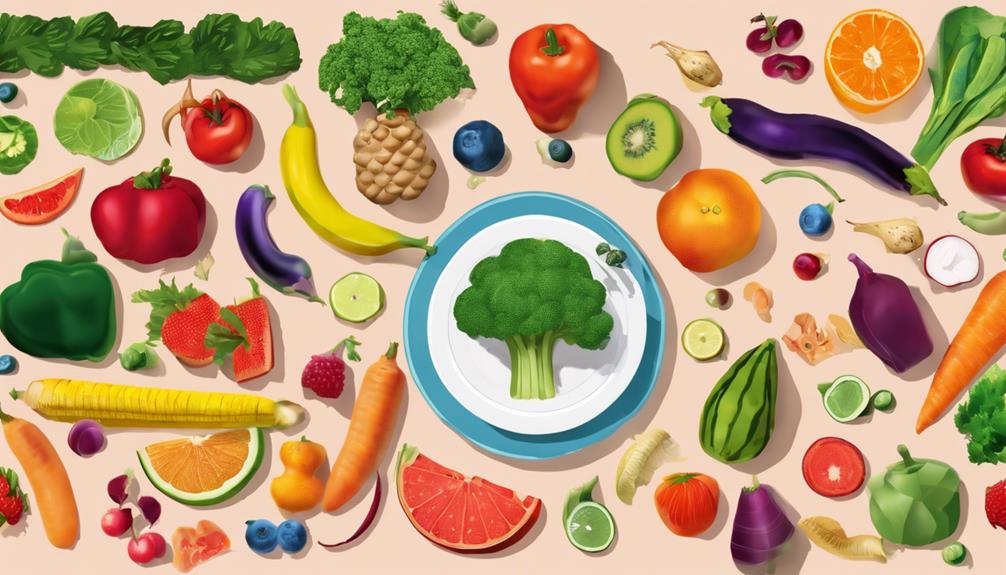How Can I Ensure I'm Getting Enough Vitamins and Minerals?
Are you truly meeting your body's nutritional needs? Ensuring you receive an adequate amount of vitamins and minerals is crucial for your overall well-being.
From the foods you eat to potential supplement options, there are various ways to support your health. But how can you be certain you're getting enough?
By exploring the sources of key nutrients, understanding potential signs of deficiencies, and implementing healthy habits, you can take steps towards a more nourished lifestyle.
Key Takeaways
- Maintain a balanced diet with a variety of nutrient-rich foods for optimal health.
- Consider supplements from reputable brands to fill nutrient gaps safely.
- Recognize signs of deficiencies like fatigue and brittle nails for early treatment.
- Establish healthy habits like meal planning, exercise, and hydration for overall well-being.
Importance of Balanced Diet
To maintain optimal health, ensure your daily intake includes a variety of foods rich in essential vitamins and minerals. Nutrient absorption is a crucial aspect of maintaining overall well-being. By consuming a diverse range of nutrient-dense foods, you provide your body with the necessary components for proper absorption of these vital nutrients. Different vitamins and minerals are absorbed through various mechanisms in the body, and having a dietary variety ensures that you cover all bases for efficient absorption.
A diet lacking in diversity may lead to deficiencies in certain vitamins or minerals, hindering the absorption process. For example, vitamin C enhances iron absorption, while vitamin D is essential for calcium absorption. By incorporating a wide array of fruits, vegetables, whole grains, lean proteins, and dairy products into your meals, you can optimize nutrient absorption and support your body's overall health.
Key Nutrient Sources
Maintaining optimal health requires understanding key nutrient sources to ensure a well-rounded intake of essential vitamins and minerals. One of the most effective ways to obtain a variety of essential nutrients is by incorporating a wide range of nutrient-rich foods into your diet. By focusing on dietary diversity, you can ensure that you are getting the necessary vitamins and minerals to support your overall health and well-being.
To help you identify some key sources of essential nutrients, here is a table outlining a selection of nutrient-rich foods that are beneficial for your health:
| Nutrient | Food Sources |
|---|---|
| Vitamin C | Oranges, Strawberries |
| Calcium | Dairy products, Spinach |
| Iron | Red meat, Lentils |
| Vitamin D | Fatty fish, Egg yolks |
| Potassium | Bananas, Sweet potatoes |
Understanding Supplement Options
When considering your dietary needs, it's important to explore various supplement options to ensure adequate intake of essential vitamins and minerals. Supplements can be beneficial in filling nutrient gaps, but it's crucial to prioritize supplement safety. Look for reputable brands that undergo third-party testing to guarantee quality and purity.
Additionally, consider factors like nutrient absorption when choosing supplements. Some nutrients are better absorbed when taken with food, while others may be more effective on an empty stomach. Understanding these nuances can help maximize the benefits of supplementation.
To enhance nutrient absorption, consider supplements with added ingredients like black pepper extract (piperine) to boost bioavailability. Vitamin D, for example, is fat-soluble and may be better absorbed when taken with a meal containing healthy fats. Consulting with a healthcare provider or a registered dietitian can provide personalized recommendations based on your specific needs.
Remember that supplements are meant to complement a healthy diet, not replace it entirely.
Signs of Deficiencies
Ensuring you are aware of the signs of deficiencies in essential vitamins and minerals is crucial for maintaining optimal health. Common symptoms of vitamin and mineral deficiencies vary depending on the specific nutrient lacking in your body. Some general signs include fatigue, weakness, pale skin, brittle nails, and hair loss. Since these symptoms can also be indicative of other health issues, diagnostic testing is essential to confirm a deficiency accurately. Diagnostic testing involves blood tests that measure the levels of specific vitamins and minerals in your body. If you suspect a deficiency, consult with a healthcare provider who can recommend the appropriate tests to identify the specific nutrient you may be lacking. Early detection and treatment of deficiencies are vital to prevent more severe health complications. Below is a table outlining common symptoms and diagnostic testing for some essential vitamins and minerals:
| Vitamin/Mineral | Common Symptoms | Diagnostic Testing |
|---|---|---|
| Vitamin D | Fatigue, bone pain, muscle weakness | Blood test |
| Iron | Fatigue, pale skin, shortness of breath | Ferritin levels |
| Vitamin B12 | Weakness, tingling in hands and feet | Blood test |
Implementing Healthy Habits
To establish and maintain optimal health, incorporating healthy habits into your daily routine is essential. Creating routines and meal planning can help ensure you're getting the necessary vitamins and minerals your body needs to function at its best.
Here are three key habits to help you on your journey to better health:
- Daily Meal Planning: Planning your meals in advance allows you to make healthier choices and ensures you're getting a balanced intake of essential nutrients. Include a variety of fruits, vegetables, whole grains, lean proteins, and healthy fats in your meals to cover all your nutritional bases.
- Regular Exercise: Physical activity not only helps you maintain a healthy weight but also supports overall well-being. Aim for at least 150 minutes of moderate-intensity exercise per week, such as brisk walking, cycling, or swimming, to boost your energy levels and improve your mood.
- Adequate Hydration: Staying hydrated is crucial for your body to function optimally. Aim to drink at least 8-10 glasses of water a day and more if you're active or live in a hot climate. Proper hydration supports digestion, nutrient absorption, and overall health.
Conclusion
To ensure you're getting enough vitamins and minerals, focus on maintaining a balanced diet with a variety of nutrient-rich foods. Did you know that over 90% of Americans don't meet their daily recommended intake of key nutrients?
By incorporating key nutrient sources and considering supplement options, you can help prevent deficiencies and promote overall health and well-being. Remember to listen to your body and consult with a healthcare professional for personalized recommendations.







